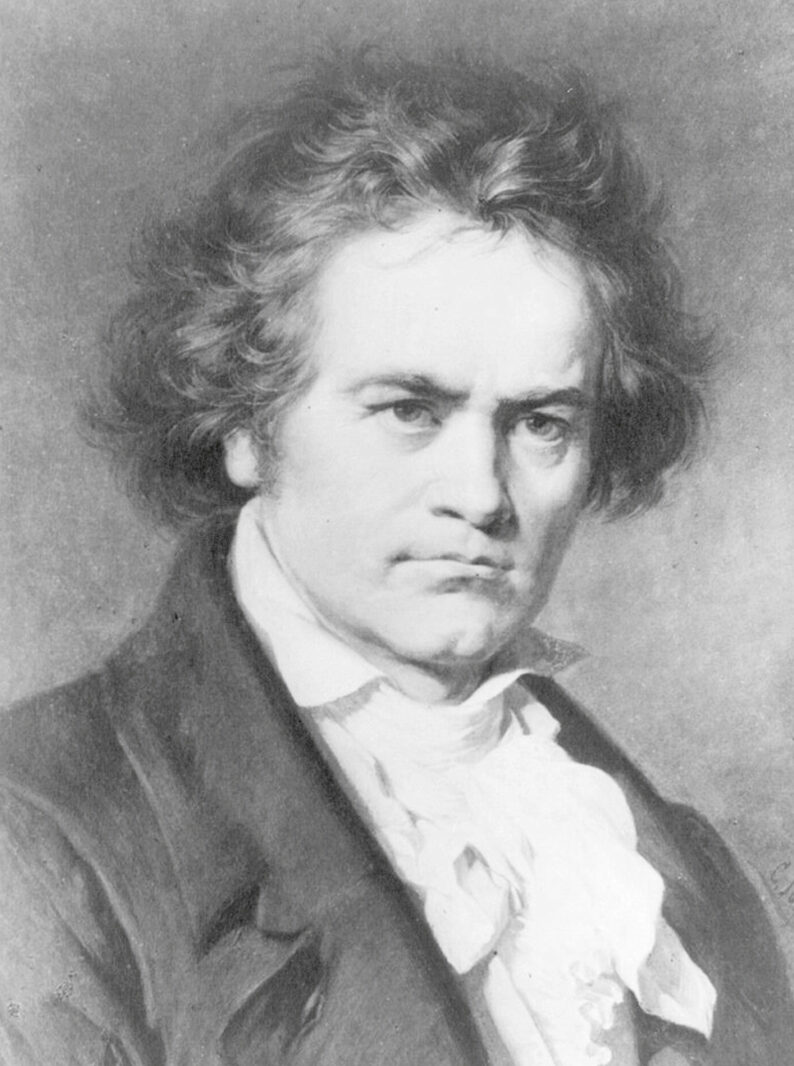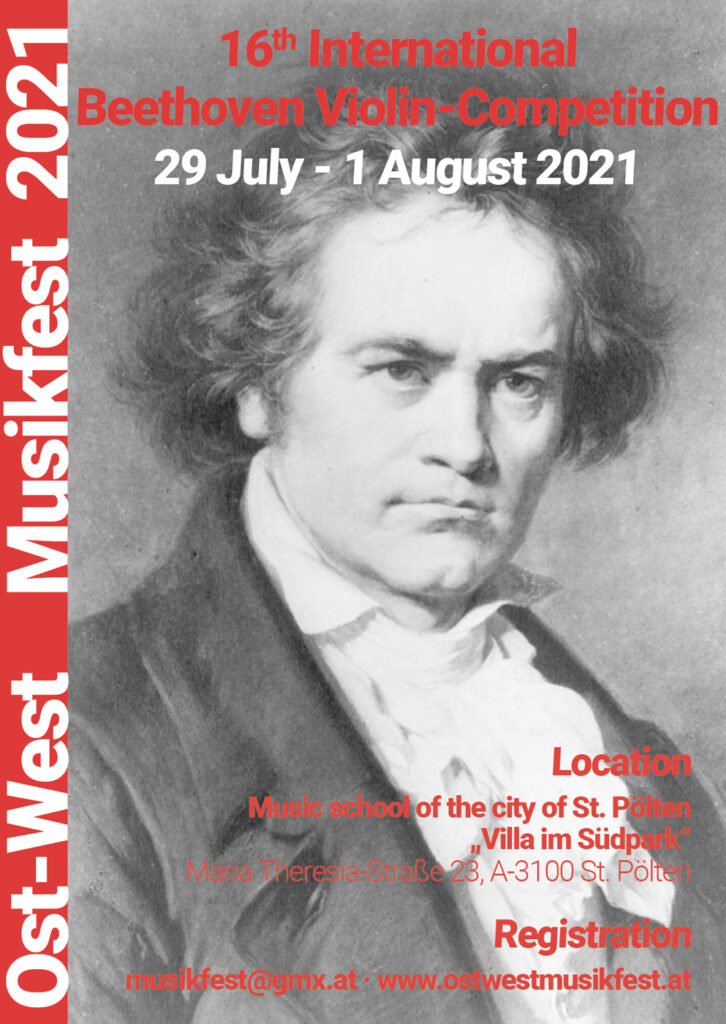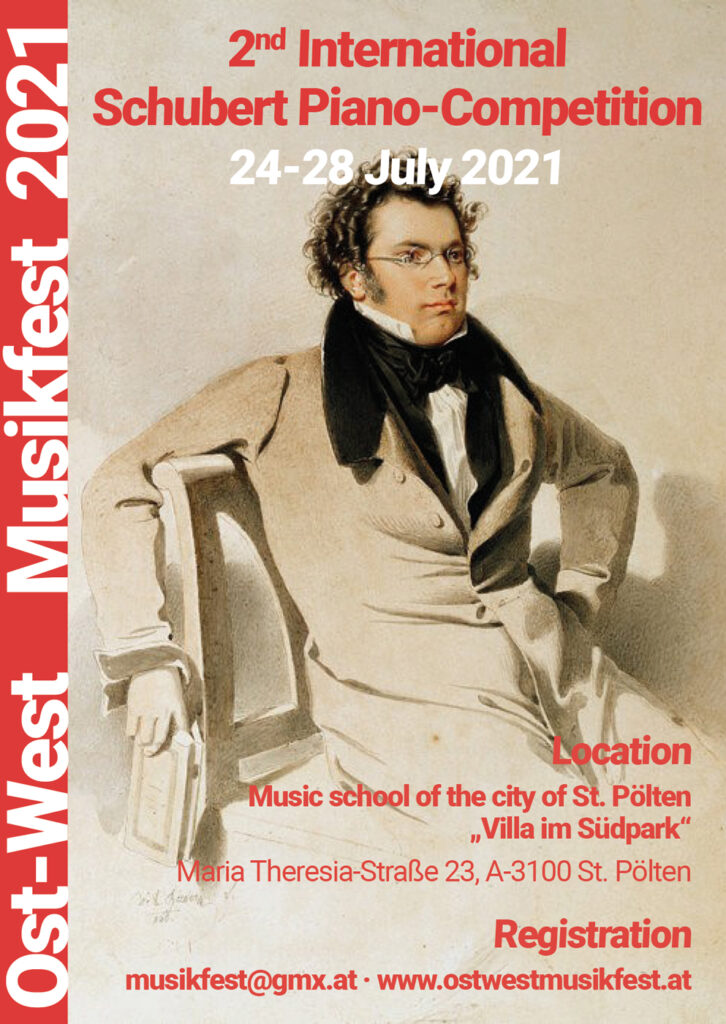16. International Beethoven-Competition for Violin,
29 July-1 August 2021
Violin: 18-30 years, 1st round, 29 July, 10 am
1) fuga of a Solosonata by Johann Sebastian Bach,
2) Niccolò Paganini: one Caprice of op. 1
3) one virtuoso piece with piano, or violin solo
4) Wolfgang Amadeus Mozart, 1. movement + Cadenza of Violinconcertos KV 218, 219
5) 3 questions of Leopold Mozart`s Violinschool (1756)
Final selection: 31 July, 10 am
1) Ludwig van Beethoven 3rd movement of the Violinconcerto with Cadenza
2) One fast movement of a romantic concerto
Violin: 13-17 years, 30 July, 10am
1) A caprice for violin solo
2) A virtuoso piece (max 10′)
3) Ludwig v. Beethoven, a slow movement of a sonata or Romance in F, or G
4) Wolfgang Amadeus Mozart, 1st movement + cadenza from violin concerto KV. 216, 218, 219
Violin: 8-12 years, 30 July, 10 am
1) A caprice for violin solo
2) A virtuoso piece (max 7′)
3) Wolfgang Amadeus Mozart Violinconcerto
or Joseph Haydn, Violinconcerto C Major: 1st movement with Cadenza by Arthur Grumiaux (available: musikfest@gmx.at)
Finalists Concert: 1 August, 6:30 PM
South Park Villa St. Pölten/ Music School
Depending on the decision of the jury, the candidates have to partially or fully present the works. With the exception of the sonatas, all works are to be played by heart! All appearances are public. The decisions of the jury are final. The Ost-West Musikfest has the right to produce and publish photos, videos and sound recordings without the participants‘ financial claims. The award winners are obliged to attend the award winner concert without remuneration. We accept no liability for damage to instruments or the property of the participants. ONLY Urtext editions & articulations are permitted! NO arrangements by: Joachim, Yampolsky or similar arrangements! The order in which the participants appear is alphabetical.
Questions and answers about
„Leopold Mozart’s Violin School“
1st Chapter: §3: „Musical Art Words“- (musical charachters of movement) selection:
Allegro assai and presto, are just little different from each other:
Allegro: „funny, not hasty tempo“
Molto Allegro: „only little faster than Allegro“
2nd Chapter: Bowings § 6
4. „You have to get used to a long, unseparated (legato), gently flowing
bowing“.
5. „The bowing must be consistent, and evenly with moderate pressure“
4th Chapter: Bowing rules for up and down § 15, § 38
§ 15 „if a note is dotted, later pressure than on the main note, or on the
prenote is not allowed“
§ 38 „all notes (of 4 equal) must always be played with the same length of
bow and in same metrum“
5th Chapter: Sound & Legato § 5-14
§ 5-8 exercises for sound control (see also at Ivan Galamian)
§ 9 „melodies have to be played with very even use of bow and balanced
sound“
§ 10 „The bow change must becalm and inaudible“
§ 12 „For an even sounding melody is required a even and singing bowing.
„In the piano there needs to be heard a round and fat and never weak
and flutelike sound, just less loud than in forte“
§ 13 „empty strings may be used only rarely. Flagolette are to be avoided in
melodies „
§ 14 „As many notes as possible are to be played in legato and change of
bow must be connected without any noise“
6th Chapter: Articulation § 7, 9
§ 7 „Short notes are at the beginning of the bar at least to play in the
smear and must not be overplayed short.
7thChapter:
line styles, articulated notes (21b, 23b, 26b, 29b, 31a / b, 33b / c)
„weight of the bow must be only on the 1st note“
„If the 2nd note is dotted, 1st note will be accentuated and 2nd will be
played lighter“
9th Chapter: prenotes & ornamentations § 1,3,4,5,8,9,12,19,20,27,30
„prenotes & ornamentations are to be played always legato connected to the main notes and never separately“
10th Chapter: Trills §6, §11, §12
„Trills always start from upwards and can be played with or without ornament before and after trill“
„The prenote of a trill uses half the metrum of the main note“
„The ornamentation (prenote from above) must only be used once, never
twice“
12th Chapter: accentuation, articulation and interpretation §1,9,10,14,19
§1 „music should not be over-decorated“
§9 „The accent must be ONLY on the 1st note (3/4 — 4/4 1st + 3rd note)
2. International Schubert-Competition for Piano,
26-28 July 2021
1st stage, 26 July, 10 AM
max. 20 minutes
– one Praeludium & Fuge by J. S. Bach
– one study of own choice
– one piece by Franz Schubert
2nd stage/ final, 27 July, 10 AM
max. 25 minutes
– one sonata by L. v. Beethoven, J. Haydn, W. A. Mozart, oder F. Schubert
Concert of the finalists: 28 July, 6:30 PM
„Villa im Südpark/ Musikschule“ St. Pölten
Registration
1. Registration form
2. Send via E-mail
Please send us the completed form until 1 June to:
musikfest@gmx.at
3. Competition fee 150 € + piano usage 120 €
Please transfer the participation fee until 1 June to:
Account owner: Musikförderungsverein Ost-West
Bank: Erste Bank
IBAN: AT84 2011 1840 3407 5000
BIC: GIBAATWWXXX
Prices
1st – 3rd Price
In the first and second category, places 1-3 will be awarded.
Diploma
All winners receive a diploma with distinction of the place achieved.
Location
Music school of the city of St. Pölten
Maria-Theresia-Str. 23, A-3100 St. Pölten


